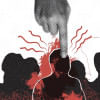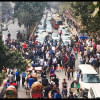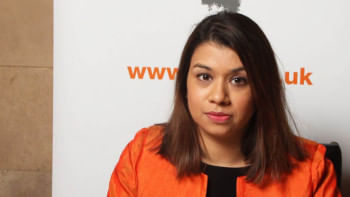The struggle for justice should not involve injustice to others

In a democratic society, the right to protest is fundamental and necessary for a just and inclusive political system. Public demonstrations, student movements, and citizen activism are signs of a politically aware population that wishes to be heard. However, as our society matures, we must improve our self expression methods.
Recent protests by students of polytechnic institutes have sparked fresh debate around this issue. Their demands, from administrative changes to curriculum restructuring, are legitimate and deserve attention. Yet, how these protests have come about is deeply concerning. In a series of demonstrations, roads and railways across the country were blocked, bringing entire districts to a standstill. In Dhaka, the already strained traffic system collapsed under the weight of such blockades.
While freedom of speech and assembly are protected rights, we must exercise them responsibly. Protests that inconvenience thousands, stranding patients on their way to hospitals, halting emergency services, and making parents miss work and children miss school, cannot be justified under the umbrella of democracy. This is not freedom of speech; it is the imposition of suffering on the innocent.
In developing countries like ours, where infrastructure is weak and cities are overburdened, we need a more sensible and structured approach to protests. The idea that roads must be blocked and transport systems must be shut down to make voices heard is outdated and destructive. It emerges from a legacy of authoritarian rule, where public discontent could only be acknowledged through extreme pressure. But now Bangladesh is in a new era, and it's time we left those old habits behind.
In many developed democracies, protest is a well-organised affair. In the United Kingdom, Hyde Park's Speakers' Corner is a globally recognised venue for public expression. In the United States, permits are required for large gatherings, and marches are often guided by police to ensure minimum public disruption. In Germany, public squares are designated for rallies, allowing protesters to voice their concerns without paralysing cities. These models show us that it is possible to protest passionately and effectively, without turning daily life into chaos. One of the main issues in Bangladesh is the absence of designated protest zones. The government should urgently consider allocating specific areas in each city, especially in Dhaka, where people can gather, chant, march, and raise slogans without affecting traffic or daily life. These areas can be equipped with basic facilities and proper security so protests can be safe, visible, and impactful.
At the same time, institutions and government agencies must be more responsive to citizen complaints and grievances. Creating dedicated "grievance redressal cells" within key ministries and organisations can go a long way in restoring public trust. These units should be empowered to receive complaints, acknowledge them, and work towards a resolution within a specified time frame. If people feel that their issues are being taken seriously, the likelihood of disruptive protests will decline.
The present government has shown a greater openness to addressing public demands than previous administrations. The swift removal of the Dhaka Polytechnic Institute principal after student protests is a case in point. Such responsiveness is commendable, but it should not be reactive. It must be part of a larger, systemic culture of listening to people before they are forced to resort to demonstrations.
Another vital step is public education. Our citizens, especially young people, must be taught the principles of civic engagement and responsible activism. Schools, universities, and community organisations can help instil the values of nonviolent protest, negotiation, and dialogue. Social media, too, can be used as a powerful tool for advocacy. It is equally necessary for law enforcement forces to maintain order. The police must be trained to distinguish between peaceful protesters and those who engage in unlawful acts. Using force should be the last resort and only when public safety is at serious risk. But when roads are blocked for hours, emergency services are halted, and chaos ensues, law enforcement must step in and restore order.
As we approach another election season, various protests will likely intensify. Political parties, student groups, and many professional bodies may all take to the streets to make their demands known. But let us make one thing clear: protests that hold an entire city hostage are not a sign of democratic maturity. They are a failure of imagination, a stubborn refusal to find better ways of expressing legitimate discontent.
We can and must do better. We must protect our right to protest, but this right should never come at the cost of the common good. We need a national conversation on protest culture, one that involves students, civil society, government officials, and ordinary citizens. Together, we must draft new norms and guidelines that ensure protests are safe, effective, and respectful of everyone's rights.
It is time we recognised that the struggle for justice should not involve injustice to others.
Md Kawsar Uddin is associate professor at the Department of English and Modern Languages, at the International University of Business Agriculture and Technology (IUBAT).
Views expressed in this article are the authors' own.
Follow The Daily Star Opinion on Facebook for the latest opinions, commentaries and analyses by experts and professionals. To contribute your article or letter to The Daily Star Opinion, see our guidelines for submission.

 For all latest news, follow The Daily Star's Google News channel.
For all latest news, follow The Daily Star's Google News channel. 






Comments